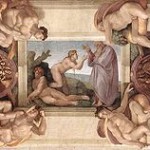Eve – God’s Gift to All
One of my long term interests has been the field of the physical sciences – all branches including biology, chemistry, physics, astronomy, etc. As an anthropologist, I’m always watching for new information about humans as a species (the physical science side) and as beings with meaning systems that help them make sense of the world around them (the social science side).
A few years ago, (OK so it was a lot of years ago – 1988), I read about the discovery in central Africa of the remains of a woman who seems to be ancestral to all current living human beings. The folks who found her remains and were studying them dubbed her “Eve,” or “Mitochondrial Eve.”
“Eve” came to my attention again this week because of this headline on www.msn.com, “Age confirmed for ‘Eve,’ mother of all humans.” The article explains that mitochondrial DNA from a woman living approximately 200,000 years ago is shared in an unbroken line by all living humans today. This report of the study confirming the age estimates of the original researches explains how the age estimate was reached and notes that “Eve” was not the first or only woman living at the time. It’s just that for whatever reason, only her mitochondrial DNA has survived in unbroken succession to contemporary humans. All other lines ended at some point when women of the line had only sons. Mitochodrial DNA is found only in human ova (eggs), so passes only along the female line. (Mitochondria are organelles present in human cells, serving as the powerhouses that produce the energy needed for life.)
For folks who come from a religious tradition in which the first woman was also called “Eve,” (“mother of all the living” Gn 3:20), the choice of name for this ancient woman resonates on many levels.
As school is starting again in the US, the question of how the origins of the human species occurred will almost inevitably be raised again in school districts and perhaps even courts. Bishop James Ussher (1581-1656) calculated that according to the Bible, creation occurred the night preceding October 23, 4004 BC according to the Julian calendar. Some very deeply earnest people believe that his timeline is correct. They are very concerned that their children are being harmed by educational programs that teach otherwise.
The purpose of this post is not to open that whole can of worms.
Our Catholic tradition does not insist that the early accounts of the creation, the great flood, or even the lives of the Patriarchs and other Biblical figures were literally, historically true. We have no problem with the idea that creation could have occurred over a period of billions of years, or that it could still be on-going. So it really doesn’t matter whether all descended from one woman and one man around 6,000 years ago or 200,000 years ago or 1 million years ago.
This is where it gets to be fun to be an anthropologist. The issue is how we explain the world around us. How did we all get here? Why do we do things differently from the way others do them? Are they human too? Why do we do things that hurt others? Why is it so hard to do what we know is right? Is it really right?
Teasing out the strands of meaning that bind together the members of a culture takes a long time. Meaning is embedded within the fabric of social relations. It seems so obvious to a member of a culture that theirs is the only way to understand life and social interaction that folks who don’t share that system of meaning may be seen as less than human. It’s a problem shared by groups of people (or “peoples”) around the world, and is at the root of a lot of the larger problems we have today as citizens of a global community.
The thing that makes the dating of the life of “Eve” so exciting for me is that it makes so clear the reality that despite the myriad ways we humans have found for explaining the world around us, within us, and between us, we all share a common biological heritage. We are all sisters and brothers. Our explanations of reality are often different. Even within one country, culture or family, we may explain things differently. But underneath all the diversity, we are one family.
As we move forward, we must remember this reality. We are sisters and brothers. Muslims and Christians and Jews, and Hindus and Buddhists and Taoists and those of tribal faiths and those of no faith at all — all are brothers and sisters. May the Lord bless us with a deep awareness of this gift and the faithfulness to live in peace and justice and love on this world we share.










